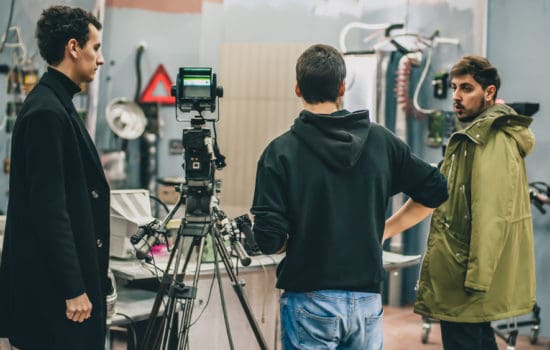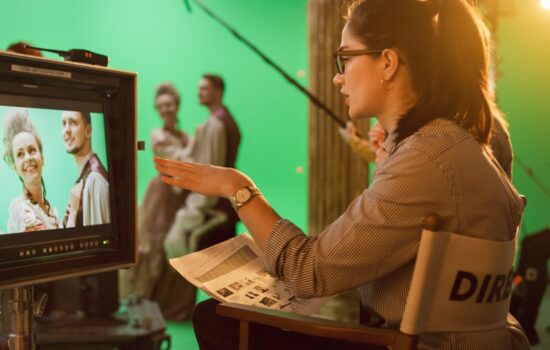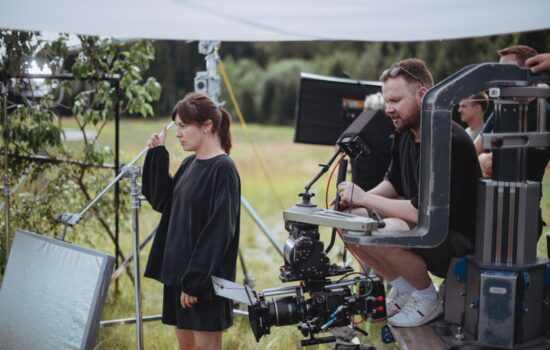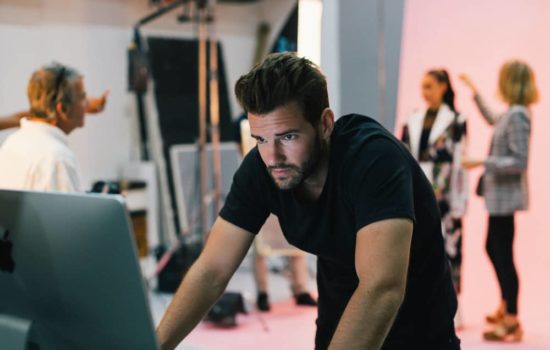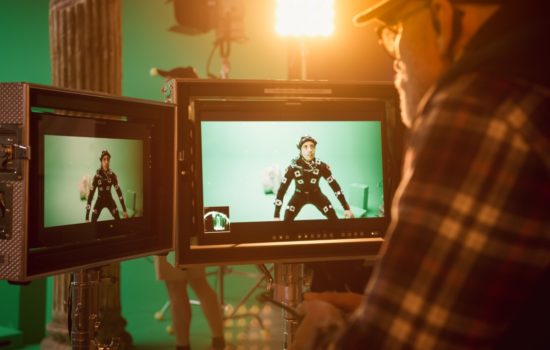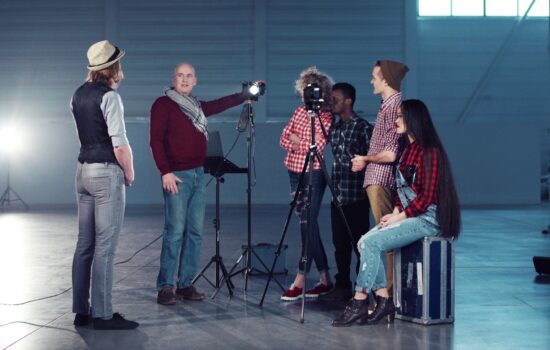Field Recording Mixer
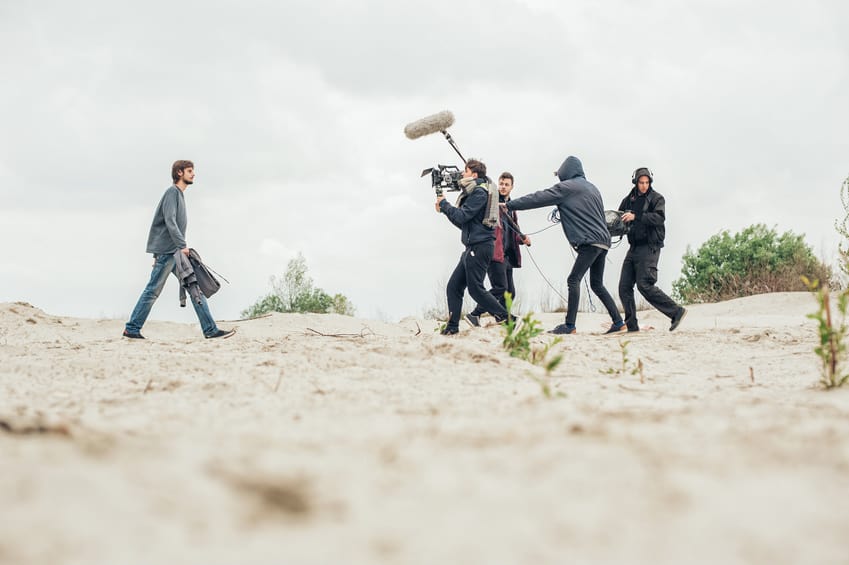
How To Become a Field Recording Mixer
People also ask
Career Description
“The Field Recording Mixer oversees capturing all of the Actor’s dialogue on set with the best signal-to-noise ratio. Their goal is to catch as much clean dialogue as possible, make notes on the good takes for the Post Sound Team, and provide a workable mix for the Film Editor,” says Los Angeles-based Scott Neff. If shooting on location, the Production Sound Mixer may also record the environment for the post-production team.
The Production Sound Mixer works in the pre-production and principal photography phases of filmmaking. As part of pre-production, they’ll attend location scouts and secure the required gear for production. On the shooting days, they arrive on set and set up their sound cart.
After that, they’ll begin talking to the Camera Department to set up a scratch track between their gear and camera for time code. It’s important to get a clean frequency because if someone radios in, it can ruin takes, which results in Producers spending money on Automated Dialogue Replacement (ADR).
To avoid any technical issues, the Field Recording Mixer will replace batteries in all his or her gear and do a frequency scan then set all of their wires to clean. Following that, they’ll make sure time code is correct and wait to watch the rehearsal or blocking of the Actors.
Once blocking begins, the Field Recording Mixer works with the Boom Operator on a strategy to capture every line without entering frame. They read the script and pay attention to the Actor’s movements. Next, the Production Sound Team clears set so the Lighting Crew can get the shot set up.
The final task of the Sound Team is to mic the Actors once they come out of Wardrobe and Makeup. The Sound Crew works with Wardrobe on where to hide the mics. It’s important that each of the lavaliers is organized for what track they’re recording on, for each Actor, to keep it simple for the Post Sound Team.
When shooting, the Field Recording Mixer creates a guide track for the Picture Editor and also supplies a feed for the Producer and Director to hear the Actor’s lines. Every space sounds different and there is never a lot of time to choose what mics to use so it’s important a Field Recording Mixer knows their gear.
At the end of the day, the Field Recording Mixer takes the SD and CF cards they’ve recorded to the Digital Imaging Technician to be backed up and passed on to the Picture Editor. They also do a sound report that has all of the character names on tracks, scene number, and any notes.
What is a Field Recording Mixer?
A Field Recording Mixer is the person on set who records the dialogue of the Actors. They also provide a rough mix of that dialogue for post-production.
Salary
The average annual salary for a Field Recording Mixer is approximately $40,800. The salary range for Field Recording Mixers runs from $25,000 to $68,000.
Field Recording Mixers set their own day rates when working on non-union or indie projects. If they’re members of the union, they’ll receive payment to scale based on the project type and their level of experience.
How much do Field Recording Mixers make?
Keeping in mind influencing factors, Field Recording Mixers typically make approximately $40,000 per year. But if they’re still gaining experience or not able to consistently book gigs, that number may drop. Conversely, veteran Field Recording Mixers with union status and frequent work can make much more than the given figure.
Hey, what do you think about trying our new Film Career HelperFilm Career Helper really quick? It’s totally free and could help get your career moving fast! Give it a try. It’s totally free and you have nothing to lose.
Career Outlook
“The work schedule varies due to its freelance nature. It’s up to the individual to establish a balance of work and life through what jobs they select. Much of the work involves traveling across the United States and even out of the country.
“The schedules themselves tend to be all over the place and Production Sound Mixers are always at the discretion of production to fulfill its schedule. Sometimes that’s waking up at 5 am to shoot and other times it’s going to bed at that time. Hopefully, set is only twelve hours but sometimes it can go longer,” explains Neff.
The line of communication for a Production Recording Mixer is always through the 1st Assistant Director for scheduling and collaborating with other departments. Outside of the Production Sound Department, the Field Recording Mixer also works with the 1st Assistant Camera to get a frame line for the Boom Operator. Finally, they work with Actors to get lavaliers set in their costumes.
Career Path
“People usually start as a Sound PA or a Boom Operator. In the beginning, they act like a Utility Sound person, wrangling cables, moving carts and charging batteries. As a Boom Operator, they can make or break the sound of a film because they’re directly affecting the recording of the film,” Neff explains.
Therefore, it’s necessary that the Boom Operator is in constant communication with the Production Sound Mixer to achieve the best possible production audio. The result of this close collaboration is learning about field mixing and what good audio is.
“The easiest way to land a position within the Production Sound Department is to talk to working professionals,” advises Neff.
Field Recording Mixers are generally technical nerds who love to talk about sound mixing. Hit one of them up. Offer to buy them a beer or coffee to establish a relationship and be available to wrangle cable for free. Making friends with people who are sound professionals will yield more success in job hunting than scrolling through Craigslist.com or Mandy.com.
It isn’t difficult to advance in the Sound Department in the independent film world. The major factor is owning gear. Most Producers expect a Field Sound Mixer to be an owner/operator. The more gear owned, the easier it is to land a job.
If someone needs money to buy equipment, then boom operate for Production Mixers to gain capital and experience on set. This will also create favors so when a Boom Operator is needed, the aspiring Production Mixer can call in other Sound Mixers he or she has worked with to boom operate.
- Start networking and talking to people who are Field Recording Mixers. They will share their experiences of being on set and what the proper etiquette is.
- Read online forums for JP sound.
- Listen to high-quality media, both film and music. Upgrade listening devices and try to figure out how to get that sound when recording.
Experience & Skills
“A Field Sound Mixer’s major asset is having precise ears,” Neff says.
“They need to be taken care of and developed. Much of the training comes from practice and school but also aspiring Sound Technicians can take it upon themselves to listen to music through high-quality headphones or speakers. Breaking down the different musical elements of a song teaches critical listening and that will help get better recordings on set. The better ears a Production Sound Mixer has, the easier it is for them to do their job.”
“It’s important for a Field Recording Mixer to stay calm under pressure and be personable. Most of the day is spent waiting for lights, wardrobe, and camera. Then everyone waits for the Sound Team and it’s suddenly ‘Go, Go, Go!’ so decisiveness is an asset. Being social is an important aspect as well,” says Neff.
The Sound Team is one of the final departments to interact with Actors before they shoot. The Sound Technician needs to be able to read the Actors’ headspace and work with them in a polite manner to attach a microphone (usually running a wire down their shirt or pants).
Production Sound Mixers will succeed if they have social skills and know-how to approach and talk to people because then Actors will like working with them. Being friendly and social is a great asset.
Why do you need a Mixer for recording?
A Field Recording Mixer is essential during the making of a movie or television show. That person uses their sound expertise to capture the best quality dialogue on set. Their efforts can prevent the need for ADR in post-production, which can be both costly and time-consuming.
Education & Training
Many people go to school for Audio Engineering, not only to learn about production sound but also to make connections. It doesn’t prepare them for their first real film set so it’s always good to stay humble and learn as much as possible from working professionals. School does create a network that can lead to jobs in the future, as well as a theoretical understanding of the physics of sound.
“A lot of Field Recording Mixers also learn how to fix their own gear, which is an asset if something breaks down on set. It’s important to study, whether it is taking an entry-level job on set or attending a film production program,” says Neff.
Additional Resources
“The best online resource is Soundrolling.com by Matt Price. He has valuable online tutorials, cheat sheets for audio equipment, and a great philosophy on sound. One of the best books to read is The Location Sound Bible by Rick Viers. He outlines pretty much everything that is needed to be known to work on set,” Neff says.
In Los Angeles, Field Recording Mixers are represented by IATSE Local 695 (sound/video/projection).
FAQ
What is the single biggest suggestion you would give to someone wanting to get into this career?
“The best advice for a Field Recording Mixer is to listen to what is happening on set. If they overhear what is going on, then it’s easier to anticipate what is going to happen and be ready. It’s a huge asset to production for the Sound Team always to be ready.”
“It also sets the Production Sound Mixer apart because most people working that job are asking everyone to hold while they set up. Even if it’s for a minute that can get very annoying.”
What’s the #1 mistake people make when trying to get into this career?
“The biggest downfall of Production Sound Mixers is their lack of social skills. Bringing a bad attitude on set or a know-it-all-attitude is a career killer. Additionally, it’s a sensitive position because they’re putting microphones in intimate places for Actors and Actresses. If lewd comments or jokes are made, the Sound Recording Mixer will get fired.”
What is the question people should ask about this career but rarely do?
“What social skills are required to production sound mix?
“People never ask about social skills. There are some amazing Production Mixers but if the Actors don’t like them or the Camera Team believes they’re annoying it will create discord on set and they’ll most likely be fired. The position is technical but having good social skills makes careers. They don’t need to be the life of the party, just tactful and respectful. Smiling helps.”
What is one thing I should have asked which I didn’t?
“Who holds the Production Sound Mixer accountable?
“Sound is a weird position because nobody can see or check their work until the day is done. The Producer’s and Director’s headphones are just there for them to hear the Actor’s lines. They aren’t high-quality enough to pick up background sounds or the quality of reception.
“Therefore, it falls on the Sound Mixer to make sure they are diligent in getting good sound if they want to get hired again in the future. Everything comes out in the wash when the Post Audio Team starts working with the dialogue. They tell the Producers how much money needs to be spent on ADR, which influences if the Producer will hire the Production Sound Mixer again in the future.”
If you could describe in one word what makes you successful, what would it be?
“Accountable.”
Sources
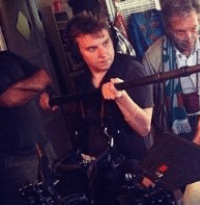
Scott Neff
Scott Neff has worked at Sonic Magic Studios as a Dialogue Editor and currently does freelance work as a Production Sound Mixer and Boom Operator. Some of his past projects have included: Paloma’s Flight, The Broken Rose, Bad Kids, War Paint, Traces, All Sewn Up, Coffin 2 and The Lears. He is based in Los Angeles.
References
- 1. "Recording Mixer Salaries in United States". . published: December 14, 2019. retrieved on:
